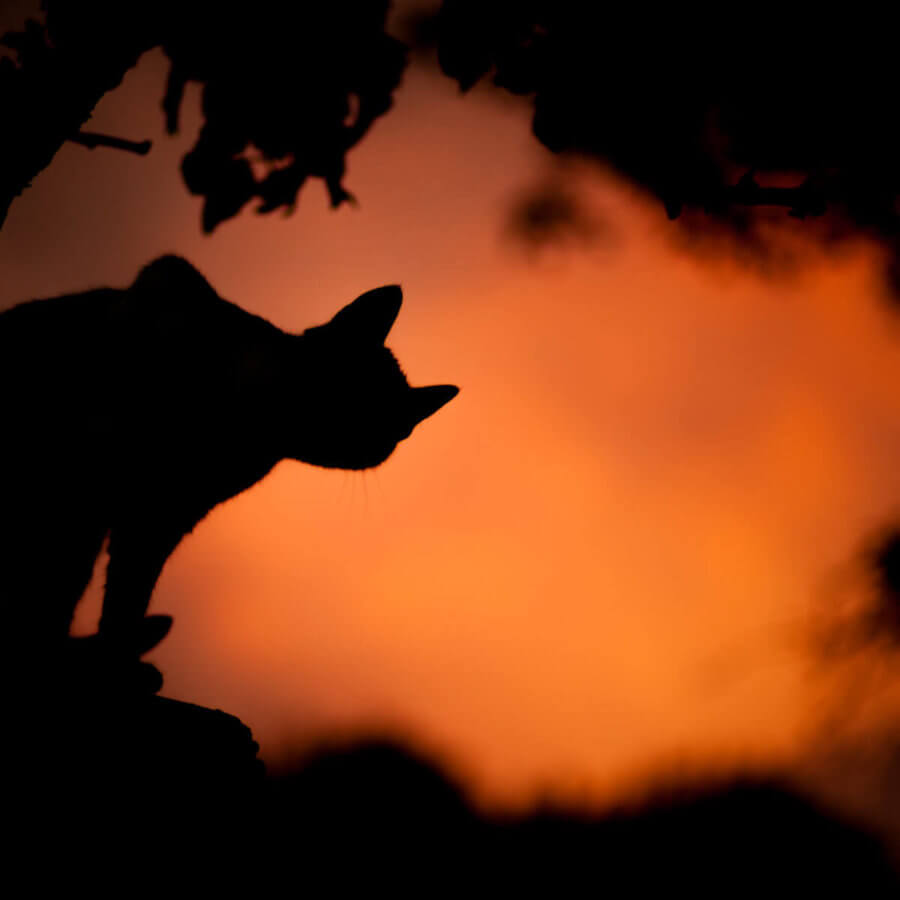
Cat waited for Miriam to get up. He waited a long time, but she didn’t rise. She didn’t put fresh herring on his plate. She didn’t fill his water bowl. She didn’t open the back door so he could refuse to go out in the snow. She didn’t clean his box, even when he mewled and scratched sawdust all over the rug.
By afternoon, Cat was very hungry.
He walked around the cottage, tail held high and twitching. The sun was going down. Miriam hadn’t put any wood on the fire all day, and even the embers had died down on the hearth. It was getting chilly. Already, the frost on the outside of the windows had started to creep inside the glass. The landscape surrounding Miriam’s cottage was white, softly folded beneath new snow.
Cat was cold. Miriam was cold too. She hadn’t watered the plant on the table, and its single blue flower had begun to droop. She hadn’t touched her knitting. The woolen balls of yarn lay abandoned in the basket. Cat could play with them all he wanted and Miriam wouldn’t be there to scold him, but he left them alone. Playing with the yarn was really only interesting if Miriam told him not to.
He curled up on the bed next to Miriam. The sheepskin-throw soothed him, but he missed his warm spot by the fireplace, and his other warm spot near the iron stove. He missed Miriam’s calloused, gentle hands stroking his fur. Cat looked at Miriam. She lay very still under the covers. She wasn’t moving. She wasn’t breathing. He understood that Miriam might not get up to feed him at all today, or any other day.
A long time ago, Cat had been colder and hungrier than this. He’d been wounded and hunted. Some people from the village had chased him through the snow. They had wanted to kill him for his black fur and yellow eyes, but Miriam had let him in.
“He’s the devil!” a man had shouted as Cat cowered behind Miriam, nursing a wounded leg and paw. “Mama Jordan’s cows have all gone dry, and the Pellers’s horse went lame, right after this cat was seen close by.”
Another man had raised his voice.
“My Nellie just gave birth to a baby with a red birthmark on its forehead, shaped like a five-pointed star. That demon cat was there when it happened!”
“The cat has to burn!” a woman had shouted.
Cat didn’t want to burn. Fire was nice, but not when you were tossed in the flames. He’d licked his hurt paw, hoping he wouldn’t get another taste of the pitchfork.
“Go home, the lot of you,” Miriam had said, wielding her broom as if to fend them off. “This cat is in my house now. If you want to burn him, you’ll have to step inside.”
Cat had watched the crowd from behind Miriam’s skirt. He had seen the fright on their faces. Someone in the back had suggested they should burn the house with both Miriam and Cat in it.
“You want to try that, Alan Wickers?” Miriam had said, in a friendly voice. “But then, who will make that salve for your nether regions when you get the rash again?” She looked at all of them. “Who will get the fever off your children in the spring? Who will get the little people to leave your barns alone?”
Grumbling, the angry people had eventually left, and Miriam had cleaned the cut on Cat’s leg, smearing it with honey and wrapping it in linen. She had served him a full bowl of chopped liver – herring roe on the side – and made a bed for him by the fire from a thick blanket padded with carded wool. Never in all his days had Cat eaten so well or slept so soundly.
He had stayed with Miriam ever since. And now she’d left, leaving him and her body behind.
Cat watched Miriam’s face as the darkness gathered outside. A half-moon shone in between the curtains. Cat was thinking. Making cows go dry and horses lame had been fun, at least for the first millennia or so. He’d had some good times giving out birthmarks, and making the gargoyles in the cathedrals weep blood once or twice too. But a cat-demon’s life was lonely and hard, and you never knew when someone might get the idea to skin you, or burn you alive.
Dawn crept through the trees and into the cottage. It touched Miriam’s wrinkled face, sparkling in the gleam of white between her eyelashes.
Cat curled up next to Miriam’s ear.
“Miriam”, he whispered.
There was a sudden rush of heat in the room, as if someone had opened a furnace, unleashing the roar of fires deep below, and then all went quiet. Cat’s voice was so hot that a tongue of flame almost licked Miriam’s grey hair. Still, he breathed out her name just a little longer than necessary, to get the arthritis out of her joints, too. The flower on the table heard him as well – its drooping stem straightening.
Cat waited. Eventually, Miriam’s eyes opened. She coughed. She blinked in the dawn light.
“My goodness, Cat. Did I oversleep? You must be starving.”
Cat meowed as pitifully as he could, threading his black body between her legs as Miriam got up and fetched the herring from the bucket out back.